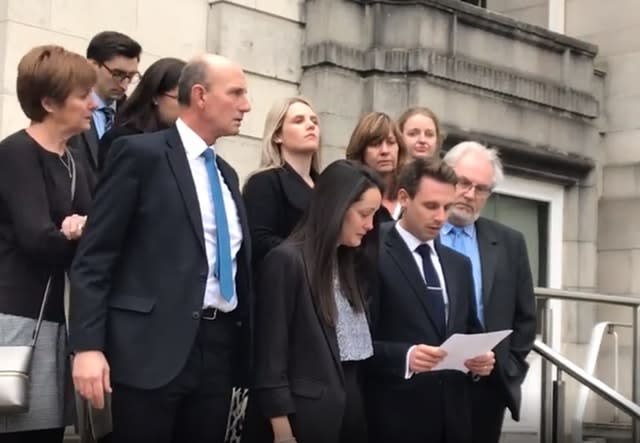‘Avoidable’ death of newborn must be turning point for NHS trust, parents urge
The “wholly avoidable” death of a baby seven days after his emergency delivery should be a “turning point” for the NHS trust involved, his parents have said.
Harry Richford died a week after he was born in November 2017 at the Queen Elizabeth the Queen Mother Hospital in Margate.
Bosses at East Kent Hospitals University NHS Foundation Trust, which runs the hospital, said it was with “great sadness” that they accept failing Harry and his family.
It comes amid reports that at least seven preventable baby deaths may have occurred at the trust since 2016.
At the conclusion of Harry’s inquest on Friday, Coroner Christopher Sutton-Mattocks listed a series of errors he found with the care given at the hospital.
He gave a narrative conclusion that Harry’s death was contributed to by neglect and had been “wholly avoidable”.
Harry’s mother Sarah Richford had been taken to theatre for an emergency Caesarean section on November 2.
Handing down his conclusion at County Hall in Maidstone, Mr Sutton-Mattocks said Harry should have been delivered within 30 minutes at 2am – but instead he was delivered at 3.32am, 92 minutes after an expert had advised he should have been delivered.
He also found that an inexperienced doctor was in charge of the birth, and there was a failure to request support from a consultant earlier.
Following the judgment, Harry’s parents Sarah and Tom Richford criticised the trust, claiming it “tried to avoid outside scrutiny and failed to learn from this and previous similar cases”.
Mr Richford added: “Accidents happen every day, but failing to learn from them appears to have become part of the culture of this NHS trust.”
The Care Quality Commission (CQC) has carried out a no-notice inspection on the trust.
An investigation by the BBC on Thursday found at least seven preventable baby deaths may have occurred at the hospital group.
Mr Richford said: “All of those cases, had they learnt from those cases, we wouldn’t be stood here today because Harry would be alive and well.
“We want this to be the turning point so it does not happen to other families going forward.”
The trust said it has made a number of changes following Harry’s death, including a training programme for staff in identifying and supporting difficult births.
But when Mr Richford was asked about the measures, he said he is not “convinced at present they have the resources and the systems in place today to prevent it”.
He added: “This risk was present from at least as far back as 2014, when the number of serious incidents on maternity were highlighted.

“We have read about Morecambe Bay and Shrewsbury and Telford, and find the similarities to Harry’s case frightening.
“We are calling for the Secretary of State to arrange an independent investigation or inquiry into Harry’s death and maternity services at East Kent.”
Following the inquest, Dr Paul Stevens, medical director at East Kent Hospitals, said in a statement the trust is “so sorry and apologise wholeheartedly for the devastating loss of baby Harry”.
He added: “We cannot imagine the pain the Richford family has endured.
“The lessons we can learn from their continued commitment to understanding the circumstances of Harry’s death will help families in the future.”
Mr Sutton-Mattocks said of Harry’s parents: “They are grieving for a child they believe should not have died.
Following the conclusion of the inquest into the death of baby Harry Richford at the Queen Elizabeth The Queen Mother Hospital, Trust Medical Director Paul Stevens has wholeheartedly apologised to the family for the devastating loss of Harry: https://t.co/jbzlgOQ9Ju
— East Kent Hospitals (@EKHUFT) January 24, 2020
“I agree with them. Mr and Mrs Richford were failed by the hospital, but more importantly, Harry was failed.”
The inquest heard Mrs Richford, a teacher, was considered to be “low-risk” during her pregnancy with Harry, who the coroner said was “much desired and much loved”.
After arriving at hospital, Mrs Richford was given a drug to speed up labour over a period of 10 hours – a decision criticised by experts as it hyper-stimulated Harry.
She was rushed to theatre when he began to show signs of distress, where medics tried to deliver with forceps before performing an emergency section.
Dr Christos Spyroulis, described by the coroner as “inexperienced”, delivered Harry at 3.32am.
The coroner said staff nurse Laura Guest, who had been called to help with the emergency delivery, had described the scene as “chaotic”, adding she “didn’t feel it was being strongly led”.
Resuscitation began after Harry was born “silent and floppy” and not moving.

Mr Sutton-Mattocks said the situation must have been “terrifying” for Mrs Richford, as there were between 20 and 25 people in the theatre.
Anaesthetist Dr Dhir Gurung stepped in after 28 minutes of resuscitation to intubate Harry, an action praised by the coroner, who said it gave the family seven days to spend with the baby.
When he was less than nine hours old, Harry was transferred to the intensive neonatal unit at William Harvey hospital, where he died on November 9.
His parents had pushed for a judgment of unlawful killing.
Although the coroner said he had considered this finding, he concluded the hospital’s failures were not “so large” as to fall in this category.

 Yahoo Movies
Yahoo Movies 


